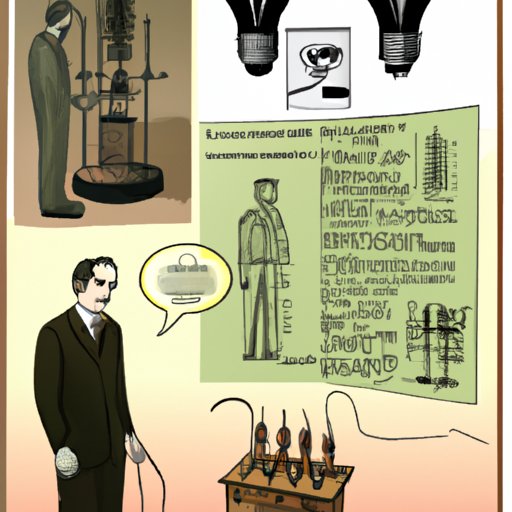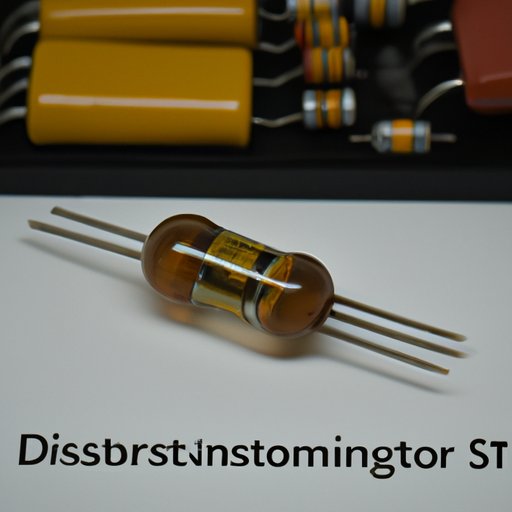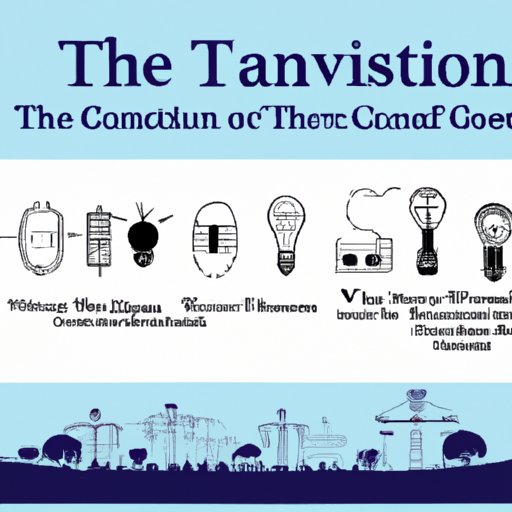Introduction
The transistor is one of the most important inventions of the 20th century. It has revolutionized the way we communicate and compute, and has had a tremendous impact on our lives. But when was the transistor invented? This article will explore the history of the transistor, from its invention to its impact on modern technology and society.
Definition of Transistor
A transistor is an electronic device that controls the flow of electricity in a circuit. It can be used as an amplifier, switch, or oscillator, and is made up of two or more layers of semiconductor material. It is a key component in almost all modern electronics, including computers, cell phones, and other digital devices.
Overview of the Invention
The invention of the transistor is credited to three scientists at Bell Labs: John Bardeen, Walter Brattain, and William Shockley. In 1947, they developed the first transistor, which was made of germanium and worked as an amplifier. This breakthrough paved the way for further development of the transistor over the next few decades, leading to its widespread use in modern electronics.

Historical Account of the Invention of the Transistor
The invention of the transistor began in the 1940s, when John Bardeen, Walter Brattain, and William Shockley were working at Bell Labs. The three scientists set out to develop a new type of amplifier using semiconductors. After several months of experimentation, they finally succeeded in building the first transistor in 1947. The device was made of germanium and used an electric current to amplify a signal.
Early Development and Applications
After the initial invention of the transistor, the technology was quickly developed and improved upon. By the mid-1950s, transistors were being used in a variety of applications, such as radios, televisions, and computers. As the technology advanced, transistors became smaller, more powerful, and more efficient, allowing them to be used in a wider range of products.
Further Development and Improvements
In the 1960s, engineers began to use silicon instead of germanium in transistors, which allowed them to be even smaller and more efficient. This development led to the invention of the integrated circuit, which combined hundreds of transistors into a single chip. This breakthrough enabled the development of modern computing, paving the way for the personal computer revolution of the 1980s.

The Benefits of the Transistor: A Look at its Invention
The invention of the transistor brought about a number of benefits that have had a profound effect on modern technology and society. Here are some of the most significant advantages of the transistor:
Increased Performance and Efficiency
Transistors are much more efficient than their vacuum tube predecessors, which means they consume less power and generate less heat. This makes them ideal for use in high-performance applications such as computers and cell phones, where energy efficiency is critical.
Lower Cost and Size
Transistors are much smaller and cheaper than vacuum tubes. This makes them ideal for use in a wide range of consumer electronics, such as radios, televisions, and portable devices. The reduced cost and size also make it possible to produce large numbers of transistors quickly and cheaply.
More Reliable Power Sources
Transistors are also much more reliable than vacuum tubes. This means that products that use transistors are less likely to fail due to power surges or other issues. This increased reliability has been invaluable for many industries, such as aerospace and automotive.

Examples of Its Use in Modern Technology
Today, transistors are ubiquitous in modern technology. They can be found in almost all digital devices, from cell phones to computers to robots. They are also used in medical equipment, automotive systems, and military hardware. In short, transistors are essential for the functioning of modern technology.
How the Transistor Changed Technology and Society
The invention of the transistor revolutionized technology and society. Here are some of the ways that the transistor changed the world:
Revolution in Communications and Computing
The transistor enabled the development of modern computing and communications. Computers became faster, smaller, and more powerful, while communication networks became more reliable and efficient. This revolutionized business, education, and entertainment, and paved the way for the internet.
Expansion of Electronics
The transistor also enabled the expansion of electronics. It allowed manufacturers to create smaller, more powerful, and more reliable products at a lower cost. This made electronics more accessible to the average person, and led to the proliferation of consumer electronics.
Conclusion
The invention of the transistor has had a profound impact on modern technology and society. It has revolutionized communications and computing, and made electronics more accessible to everyone. Today, transistors are used in almost all digital devices, from cell phones to computers to robots. The invention of the transistor has undoubtedly changed the world for the better.
(Note: Is this article not meeting your expectations? Do you have knowledge or insights to share? Unlock new opportunities and expand your reach by joining our authors team. Click Registration to join us and share your expertise with our readers.)
